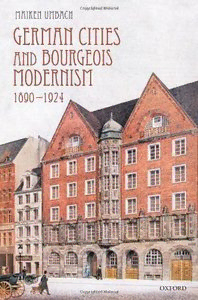
German Cities and Bourgeois Modernism PDF
266 Pages·2009·6.294 MB·English
Most books are stored in the elastic cloud where traffic is expensive. For this reason, we have a limit on daily download.
Preview German Cities and Bourgeois Modernism
Description:
This is a study of a distinctive brand of modernism that first emerged in late nineteenth-century Germany and remained influential throughout the inter-war years and beyond. Its supporters saw themselves as a new elite, ideally placed to tackle the many challenges facing the young and rapidly industrializing German nation-state. They defined themselves as bourgeois, and acted as self-appointed champions of a modern consciousness. Focusing on figures such as Hermann Muthesius, Fritz Schumacher, and Karl-Ernst Osthaus, and the activities of the Deutscher Werkbund and other networks of bourgeois designers, writers, and experts, this book shows how bourgeois modernism shaped the infrastructure of social and political life in early twentieth-century Germany.
See more
The list of books you might like
Most books are stored in the elastic cloud where traffic is expensive. For this reason, we have a limit on daily download.
